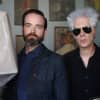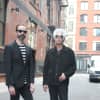Jim Jarmusch's three decades of films bear, on a surface level, all the marks of a director with a fractured headspace. Since Permanent Vacation, his post-film school dropout debut, Jarmusch has picked up, deconstructed and discarded virtually every genre convention that you can picture. Prison breaks, anthology films, westerns, hitmen and spy dramas populate his life's work, but mostly he uses these genre trappings as set pieces—as rooms to house casual conversation and metaphysical musings that lend his work a clear focus despite its disparate appearance.
Now, in his 11th feature, Only Lovers Left Alive, that singular focus becomes even more apparent. In this new Tilda Swinton and Tom Hiddleston-starring vampire flick, Jarmusch's currency is 'cool,' an ephemeral and eternal sophistication shaped simply by spending so many years here on earth. Hiddleston's Adam and Swinton's Eve, in black sunglasses and leather gloves, are centuries-old vampires who've had time to see just about all there is to see, and who have gotten a little bored with the whole ordeal. Disgusted with the “zombies”—that’d be us humans—who are polluting their world, Adam holes up in his Detroit home and spends his time listening to old blues 45s and crafting what Jarmusch has described as "anti-virtuoso" ambient music. It's a snobbish exercise, a fact that's not lost on Jarmusch or any of the films major players, but it also calls attention to the musical undercurrent in all of Jarmusch's films. The music, for Jarmusch, creates the cool.
Stream: Only Lovers Left Alive Official Soundtrack
Jarmusch has always paid great attention to his scores (commissioning greats like Neil Young and John Lurie for Dead Man and Mystery Train respectively) and his soundtracks (inspired choices abound, but the inclusion of excerpts from Sleep's Dopesmoker in Broken Flowers is a highlight among highlights). But never has Jarmusch foregrounded the acts of musical composition and appreciation as he has in Only Lovers Left Alive. Composed by Jarmusch's own four-piece, SQÜRL, Adam's music is amorphous, ambiguous and heavy. At one point, Adam describes it as "funeral music," but it's only funereal in the sense of any weighty, languorous experimental music; most of all it functions as a signifier of Adam's timeless hipness.
Jarmusch also brought in his frequent collaborator, the Dutch lute player Jozef Van Wissem, to compose some of the film's incidental music, a choice which similarly highlights the protagonists's hipness and separation from the surrounding culture. Van Wissem's take on instrumental lute music is at once experimental and traditional, grounded in the balladry of centuries past, but intent also on echoing the minimalist compositions of the present. If there's a musical analogy for the aesthetic and philosophical condition of Jarmusch's vampires, the ageless vogue-ness they exhibit, it’s Van Wissem's work.
In collaboration with All Tomorrow’s Parties, Jarmusch put together something special to recognize the importance of the music in the film for its New York premiere. In addition to taking over all of the theaters at Landmark Sunshine Theater for simultaneous screenings, the bands that make up the soundtrack gathered for an event at Santos Party House that largely echoed the spirit of the film.
At Santos, Van Wissem unfurled a few of his abstract lute compositions as the crowd (few of whom obeyed ATP's request that guests wear the requisite sunglasses and leather gloves) funneled into an upstairs room. Van Wissem's delicate songs—and his even more fragile instrument—were faced with what could’ve been an uphill battle against audience chatter, but as he made his way through a host of the pieces that he composed for the films soundtrack, the crowd was largely respectful. When Nika Danilova, aka Zola Jesus, made an appearance to accompany Van Wissem to close out his set, the response was alternately rapt and rapturous.
The film itself includes two live performances, and at the concert afterwards, those same two acts made for the night’s most engaging appearances, if only for the contrast between how Jarmusch casts them on celluloid and how they appear in person. Lebanese singer-songwriter Yasmine Hamdan appears in the film's final act in a Tangier cafe that Adam stumbles across. After watching the stunning performance of “Hal,” with Hamdan surrounded by both traditional instrumentation and formless electric guitar work, Eve casually notes that she's "sure she will be very famous." While I remain skeptical of that assertion, even following her appearance at Santos, Hamdan's performance that night highlighted her unique approach to pop songwriting. Instrumentation, courtesy of a three-piece band and a handful of backing tracks, is sparse and indeterminate, even as her vocals trace catchy melodies in a host of Arabic dialects. That language barrier, and the amorphous nature of her band's live instrumentation, might relegate her to more experimental realms, but Jarmusch is right to position her in the film as one of the more interesting forces in pop music.
The krautrock-indebted three piece White Hills, who Adam and Eve trek out to see in Detroit, put on a set at Santos that highlighted the heightened drama of their film appearance. Though the trio's one of the better psych-rock live acts going, they weren't quite the tour de force that they seemed in the film. Rock & roll hijinks just don't always translate as well on dank club stages as they do in the movies. Nevertheless, theirs is a version of rock music that begs borrows and steals from a whole host of genre-spanning influences. They're often content to stick in their lane, but they'll just as likely try a motorik beat on for size, right before launching into a guitar solo ripped straight from your dad's favorite classic rock record. It's easy to see how their approach might be close to Jarmusch's heart. Their obvious omnivorousness seems a direct parallel to the way he works.
Only Lovers Left Alive is already being heralded as Jarmusch's best work in years, and it certainly shows the eight plus years of development that he and Swinton put into the film. It boils down the very essence of what makes his films as engaging as they are, even as he engages with the longstanding tradition of vampire flicks. They're tales that are hard to update and make your own, and Jarmusch's undiscriminating approach to music, both contemporary and otherwise, no doubt adds to the film’s rampant successes.
* * *
Only Lovers Left Alive is now playing in New York and LA. Watch the trailer below. For more, read Emilie Friedlander's 2012 interview with van Wissem and Jarmusch.


